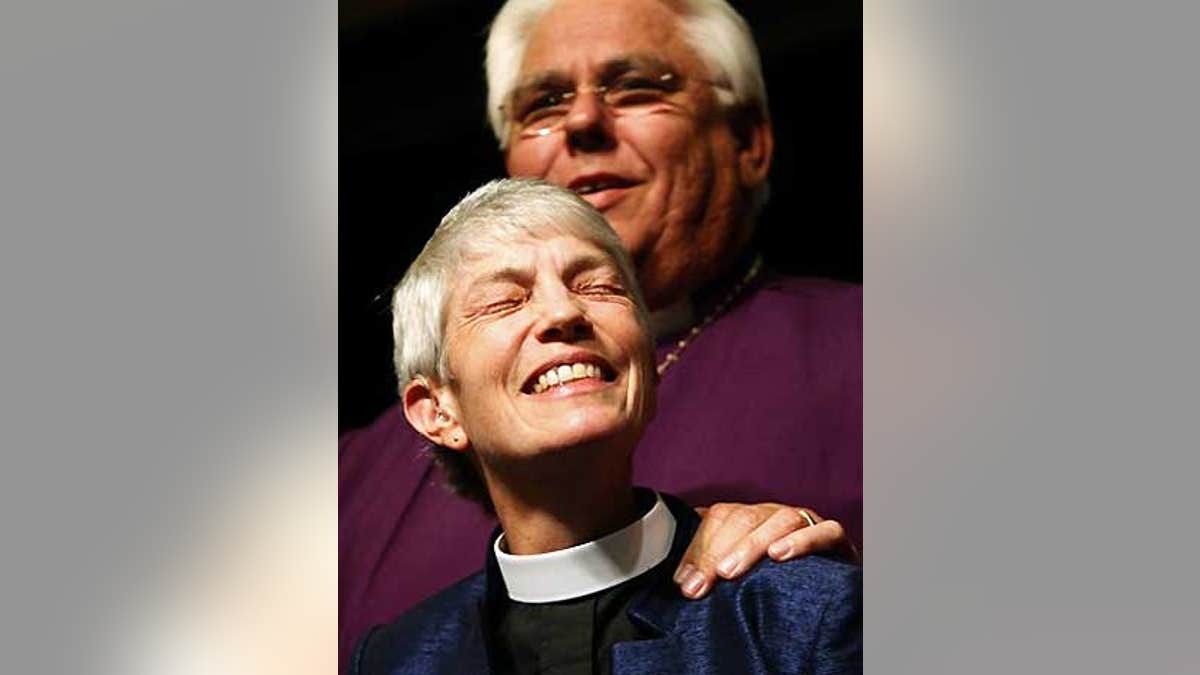
Dec. 5: Rev. Mary Glasspool of Baltimore reacts during her election in Los Angeles. (AP)
LOS ANGELES – The Episcopal Diocese of Los Angeles has elected a lesbian as assistant bishop, underscoring Episcopal commitment to accepting same-sex relationships despite enormous pressure from other Anglicans to change that stand.
Saturday's election of the Rev. Mary Glasspool of Baltimore as the second openly gay bishop in the global Anglican fellowship still needs approval from a majority of dioceses across the church before she can be consecrated.
The Episcopal Church, which is the Anglican body in the United States, caused an uproar in 2003 by consecrating the first openly gay bishop, V. Gene Robinson of New Hampshire.
Breakaway Episcopal conservatives have formed a rival church, the Anglican Church in North America. Several overseas Anglicans have been pressuring the Anglican spiritual leader, Archbishop of Canterbury Rowan Williams, to officially recognize the new conservative entity.
"Any group of people who have been oppressed because of any one, isolated aspect of their persons yearns for justice and equal rights," Glasspool said after the vote, thanking the diocese for choosing her.
Presiding Bishop Katharine Jefferts Schori, the head of the Episcopal Church, is scheduled to consecrate Glasspool on May 15 in Los Angeles, if the church accepts the vote.
Glasspool was elected on a seventh ballot that included two other candidates. She won 153 clergy votes and 203 lay votes, giving her just enough to emerge as the winner.
The election began Friday with six candidates vying for two vacancies for assistant bishops.
The winner for the first vacancy was the Rev. Diane M. Jardine Bruce, rector of St. Clement's-By-The-Sea Episcopal Church in San Clemente. As the balloting progressed for the second vacancy, two other candidates eventually withdrew.
The Rev. Kendall Harmon of the traditional Diocese of South Carolina, which recently voted to distance itself from the national church, said Saturday's vote would further damage relations among Episcopalians, their fellow Anglicans and other Christians.
"This decision represents an intransigent embrace of a pattern of life Christians throughout history and the world have rejected as against biblical teaching," said Harmon, an adviser to the diocesan bishop.
The 77-million-member Anglican Communion is a family of churches that trace their roots to the missionary work of the Church of England. Most overseas Anglicans are Bible conservatives.
In 2004, Anglican leaders had asked the Episcopal Church for a moratorium on electing another gay bishop while they tried to prevent a permanent break in the fellowship.
Since the request was made, some Episcopal gay priests were nominated for bishop, but none was elected before Glasspool. Last July, the Episcopal General Convention, the U.S. church's top policy making body, affirmed that gay and lesbian priests were eligible to become bishops.
Jim Naughton of The Chicago Consultation, a group of Episcopal and Anglican clergy and lay people who advocate on behalf of gays and lesbians, called Glasspool's election "a liberation."
"We've been around this issue for 30 years," said Naughton, an adviser to the bishop of Washington. "It's unreasonable to expect us to refrain from acting on the very prayerful conclusions that we've reached, especially when we think there are issues of justice involved."
Robinson said he told Glasspool before the election that he was grateful she was willing to put herself in the stressful position of running for bishop.
"One of the reasons she is so the right person for this is that she knows who she is and she knows she belongs to God and she knows everything else falls in place when you keep that central," Robinson said in a phone interview. "She's no stranger to people who think she shouldn't be a priest because she's a woman, or think she shouldn't be a priest because she's a lesbian."
Glasspool, 55, an adviser, or canon, for eight years to the Diocese of Maryland's bishop, said in an essay on the Los Angeles diocese Web site that she had an "intense struggle" while in college with her sexuality and the call to become a priest.
"Did God hate me (since I was a homosexual), or did God love me?" she wrote. "Did I hate (or love) myself?"
She said she met her partner, Becki Sander, while working in Massachusetts, and the two have been together since 1988. When a colleague recently asked for permission to submit Glasspool's name as a candidate in Los Angeles, she agreed because she believed it was time "for our wonderful church to move on and be the inclusive church we say we are."
A graduate of Dickinson College and Episcopal Divinity School, Glasspool was ordained in 1981, and has led parishes in Annapolis, Md., Boston and Philadelphia.
Los Angeles Bishop Jon Bruno, who leads the diocese, urged Episcopal dioceses to approve Glasspool's election and not base their decision on fear of how other Anglicans will react.
The Los Angeles diocese has 70,000 members and covers six Southern California counties. Jardine and Glasspool, whose titles will be suffragan bishops, are the first women bishops in the Los Angeles diocese.
